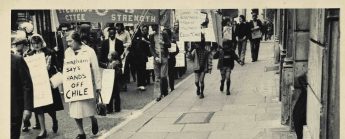
Ruth Lindley
Ruth Lindley is a PhD student looking at the place of religion and spirituality within the problematic of ‘modernity.’ You can follow her on Twitter @RuthLindley.
In September 1999, PhD student Ruth Mantin inter-viewed Jaki, a self-identified witch, about her spiritual journey with the Goddess. After discussing Jaki’s Jewish background, Ruth asked whether her relationship with the Goddess was comparable to the ‘God wrestling’ of Jewish theology:
I mean, ‘God wrestling’ to me suggests that you set yourself against him. ‘Goddess stroking’ or ‘Goddess tickling’ or something… It’s different from how God effects, God is so definitely the other that you’ll spend your whole time working out your relationship with God, whereas Goddess is just there, through us, enabling us to explore on Her behalf… Perhaps Goddess waltzing. [1]
For Jaki, Goddess waltzing was all about engaging with the sustaining symbolism of the female in divinity as an alternative to the misogyny of the monotheistic traditions. She explains to Ruth how the fluid and changing nature of the Goddess addresses what she views as the damaging “otherness” of the male God in the Western tradition:
I have occasionally experienced this as ‘other’ but most of the time to me it is the planet, it is nature, it is beauty, it is conduct of human relations which are all part of the Goddess to me… Soul, spirit, mind, body, it’s all embodied… unless we see it as embodied, acting through everything, we are going to continue with this sort of genocidal behaviour, the love of war toys, wastage of all our resources in war games, I mean wrong set of values. [2]
Jaki was one of nine women Ruth inter-viewed between March 1999 and July 2000 for her thesis on contemporary feminist spirituality. Although the common theme of Goddess waltzing ties the participants’ testimonies together, descriptions of the process are varied and sometimes divisive. For Helen, a Pagan who belonged to a local Unitarian community, waltzing with the Goddess allowed her to reject the idea of a static “true female self” and to embrace the pluralities of her experience:
The Goddess image was the mother, the woman, the child bearer, the creatrix, the whole gamut of female emotions, ways of being… I have uncovered layers of myself which has enabled me to take on other layers. I am deeply happy at the moment, it’s a wonderful feeling and it’s enabled me to be much more open to other things, other people and other situations because I don’t need to be anything particular anymore. [3]
Finding out what it meant for women like Jaki and Helen to waltz with the Goddess reveals so much rich and textured history of how faith is experienced in the modern world: a history that is lost when interpreted using current historical models. My PhD thesis looks at the oral testimonies of Ruth’s inter-viewees, and other similar sources, to messy the linear narratives that historians and sociologists use to tell the story of religion and spirituality in modernity, especially in relation to gender’s role in contemporary religious change.
When released from these kinds of stagnant narratives, the testimonies of Ruth’s participants reveal the fluid exchanges that were taking place between religion, spirituality and gender. Not only were the inter-viewees engaged in complicated and sometimes painful theological reflection when reimagining the objects and modes of their religiosity, they also engaged with the feminine principle of the Goddess as a fluid and transforming category.
A detailed study of Goddess waltzing forces us to question current scholarship on the ‘twin’ stories of gender and religion in the contemporary world. The most recent interpretations of the secularisation narrative identify women’s abandonment of the church in the 1960s as the primary motive force behind religious decline. Historians have constructed this argument around a blunt understanding of the way gender works: using the fictive nineteenth century constructions of the ‘feminisation of piety’ and the ‘privatisation of faith’ to argue that ‘heathen man’ secularised long before his counterpart, ‘spiritual woman.’
Masculine/feminine and public/private are just two of the outmoded and largely unchallenged binaries that frame the secularisation narrative and allow it to emphasise the inevitability of religious decline. Others include religious/secular; religious/spiritual; modern/tradition; bondage/freedom; East/West; universalism/particularity; progressive/outmoded. Especially in the sociological literature, these binaries carry problematic value judgements. They fail to escape from the implicit perspectives of religious institutions to whom ‘women’s spirituality’ is seen as ‘alternative’ as opposed to ‘mainstream’, ‘casual’ as opposed to ‘organised’, diluted as opposed to strong.
When viewed through the lens of this kind of reductive scholarship, Goddess waltzing looks like the result of a lot of ‘sloppy thinking.’ The willingness of Ruth’s participants to maintain several propositions simultaneously, some of which appear mutually exclusive, reflects a fluidity of thought that is too readily dismissed by historians and sociologists as unstructured and insignificant. What’s more, adherence to the clichéd historical construction of ‘spiritual woman’ allows this scholarship to emphasise the over-determined ‘feminine’ aspects of contemporary spiritual movements in order to claim that modern women turn to ‘alternative spiritualties’ because they nurture feminine qualities, which are depicted as timeless and universal.
To read the experiences of Ruth’s inter-viewees in terms of secularisation, ‘abandonment’ and ‘loss’ is to misinterpret the changing landscape of modern religiosity: it is a misinterpretation in which overdrawn binaries underpin linear narratives of change and imagined crisis. In order to better understand religious movements of the modern world we need, not just to reframe the idea of secularisation, but to remove it from our analytic vocabulary altogether. Only then will we be able to bring into focus the case studies that demand a quest for new paradigms.
[1] R. Mantin, ‘Thealogies in Process: The Role of Goddess-Talk in Contemporary Feminist Spirituality’, PhD Thesis, University of Southampton (2001), Jaki, pp. 16-17
[2] Ibid., p. 6.
[3] Mantin, ‘Thealogies in Process’, Helen, p. 5.
